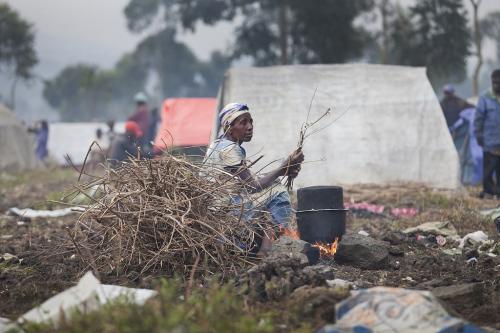UN chief urges regional, global support for Africa’s Great Lakes peace accord
Only a credible political process will end the crisis in the Democratic Republic of the Congo and address the root causes of cyclical violence in the wider Great Lakes, Secretary-General Ban Ki-moon said in a message to a high-level international summit on the situation in this strife-ridden region of Africa.

A displaced woman who fled fighting between FARDC and M23 rebels, at a camp in Kanyaruchinya, north of Goma, Democratic Republic of the Congo, (DRC).
In a message delivered by Mary Robinson, his Special Envoy to the region, Mr. Ban said the Summit of the Heads of State and Government of the International Conference on the Great Lakes region (ICGLR), presents a “significant opportunity” to build on momentum generated by a six-month-old peace agreement which has been dubbed “the framework of hope.”
The two-day summit, taking place at UN headquarters in Nairobi, is expected to be attended by the 11 African countries that signed on to the accord, formally known as the Peace, Security and Cooperation Framework for the Democratic Republic of the Congo and the Great Lakes region.
“I reiterate my call for all the signatories to the Framework to jointly and individually respect their commitments, including neither tolerating nor providing assistance nor support to armed groups,” said the UN chief in his message.
He also called on the international community to assist the signatories to work constructively to uphold their commitments and to contribute to peacebuilding programmes that could lead to stability and development for all the people of the Great Lakes region.
Yet Mr. Ban also cited challenges, expressing “serious concern” about continuing reports of killings, forced recruitment and illegal detention of civilians, including children, by the March 23 Movement and other armed groups. He added that these activities constitute serious human rights violations and “must stop immediately.”
“Any acts that undermine or target the efforts of the United Nations on the ground to protect civilians and deliver urgently needed humanitarian relief will not be tolerated,” Mr. Ban stressed.
Since the signing of the framework, Mrs. Robinson has been working with civil society and a technical committee comprised of regional participants, the UN peacekeeping mission in the country (MONUSCO) and UN partners to establish “specific, measurable, achievable, relevant and time-bound” benchmarks and indicators of progress on the framework.
The Special Envoy was scheduled to present them to the ongoing Summit, ahead of the next meeting of the framework oversight mechanism which will formally adopt them on the sidelines of the UN General Assembly high-level debate in New York this September.
In his message, Mr. Ban also encouraged all parties to conclude “as soon as possible” the so-called Kampala talks between the DRC Government and M23 rebels, held under the auspices of the Chairperson of the ICGLR, Ugandan President Yoweri Museveni.
Since mid-May, the area has seen repeated attacks by the M23 rebel group against national troop (FARDC) positions in an apparent attempt to advance on Goma and neighbouring Sake.
The M23, along with other armed groups, has clashed repeatedly with the FARDC over the past year with the rebels briefly occupying Goma in November 2012. The fighting, which recently dragged in a group of Ugandan-based rebels, has displaced more than 100,000 people, exacerbating an ongoing humanitarian crisis in the region which includes 2.6 million internally displaced people (IDPs) and 6.4 million in need of food and emergency aid.
Mr. Ban and Mrs. Robinson visited the region in May, along with World Bank President Jim Yong Kim who pledged an additional $1 billion for cross-border development in support of the framework.
Source: UN News
- 675 reads
Human Rights
Fostering a More Humane World: The 28th Eurasian Economic Summi

Conscience, Hope, and Action: Keys to Global Peace and Sustainability

Ringing FOWPAL’s Peace Bell for the World:Nobel Peace Prize Laureates’ Visions and Actions

Protecting the World’s Cultural Diversity for a Sustainable Future

Puppet Show I International Friendship Day 2020

